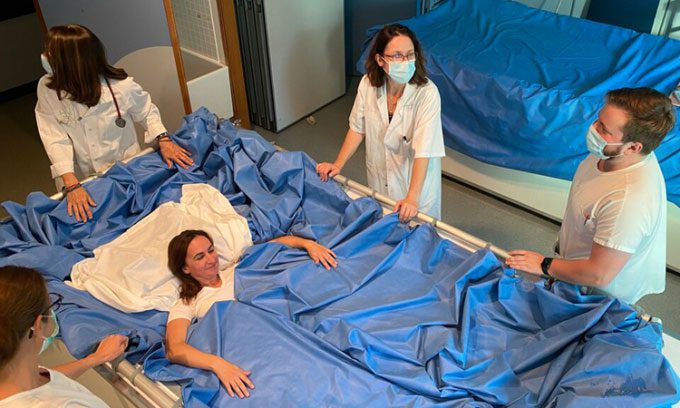The European Space Agency conducts a special experiment with female volunteers to study the effects of space travel on the body.
Twenty women are participating in a five-day bed rest experiment as part of the “dry immersion” study to simulate some of the effects of space travel on the human body. The campaign began on September 23, with the first two participants at the Medes Space Center in Toulouse, France.

Female volunteer in the “dry immersion” experiment. (Photo: ESA)
The volunteers lie in bathtubs-like tanks, wrapped in waterproof fabric to keep their bodies dry and suspended in water. As a result, their bodies will experience a sensation of “weightlessness”—similar to the feeling of astronauts floating on the International Space Station (ISS).
This is the second time the “dry immersion” campaign has been conducted with all female participants, and it is the first time in Europe. The European Space Agency (ESA) decided to carry out this research to address the gender gap in scientific data.
“There is almost no information about the physiological and psychological impacts on women in this field of research. The dry immersion study with an all-female team will complement previous male-only campaigns conducted in Europe,” said Angelique Van Ombergen, an expert at ESA.
The volunteers will be restricted in movement within a fixed environment, experiencing changes in body fluids, mobility, and bodily awareness. The research results will help assess the negative impacts of space travel, as well as investigate movement disorders in elderly patients and those unable to move on Earth.
The immersion process begins when the water rises above the chest of the volunteer. They will lie still with their torso and legs wrapped in cotton fabric, with only their arms and heads free outside the fabric. Volunteers spend nearly 24 hours each day in the immersion tank, limiting their movement as much as possible. Every day at 7 AM, experts will collect urine and blood samples. Throughout the day, a series of scientific procedures and measurements will also be conducted to study how the body adapts.
All activities, from entertainment to hygiene, are carried out within the limits of the immersion experiment. During meals, the volunteers will have an additional small pillow to make eating easier. Bathing and transitioning to other experiments are done outside the tank, in a supine position with their heads tilted down 6 degrees to minimize fluid movement.
In a weightless environment, astronauts experience reduced bone and muscle density, changes in vision, and fluid shifts around the brain. Finding ways to maintain health is crucial in space travel research. Results from studies like this are not only beneficial for astronauts but also for the elderly and patients with similar disorders.





















































